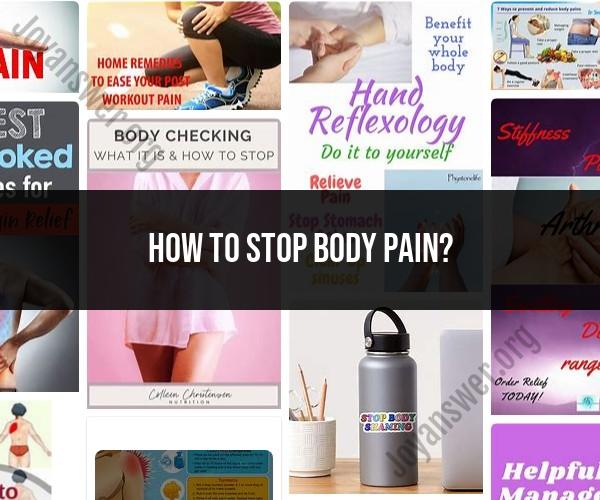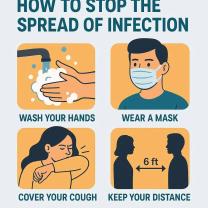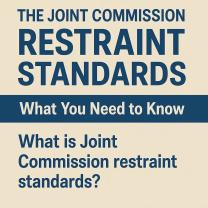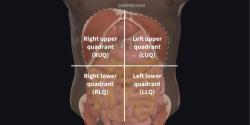How to stop body pain?
Relieving body pain often depends on the cause and severity of the pain. Here are some general tips that may help alleviate and prevent body pain:
Rest: Give your body the rest it needs to heal. Adequate sleep is crucial for overall well-being and pain recovery.
Apply Ice and Heat: Ice can reduce inflammation and numb the area, while heat can relax muscles and increase blood flow. Use ice for acute injuries and heat for chronic pain.
Over-the-Counter Pain Relievers: Non-prescription pain relievers like ibuprofen (Advil) or acetaminophen (Tylenol) can help reduce pain and inflammation. Always follow the recommended dosage and consult a healthcare professional if you have any concerns or are taking other medications.
Gentle Stretching and Exercise: Gentle stretching and low-impact exercises can help improve flexibility and strengthen muscles, which can alleviate pain and prevent future discomfort.
Massage: Professional massage therapy or self-massage with a foam roller or tennis ball can help relieve muscle tension and reduce pain.
Maintain Good Posture: Poor posture can lead to muscle imbalances and pain. Pay attention to your posture, especially when sitting or standing for long periods.
Ergonomic Workspace: If you have a desk job, ensure your workspace is ergonomically designed to reduce strain on your body, including your back, neck, and wrists.
Hydration: Staying well-hydrated is essential for overall health and can help prevent muscle cramps and stiffness.
Proper Nutrition: A balanced diet rich in vitamins and minerals can support your body's healing processes and reduce inflammation.
Stress Management: Chronic stress can contribute to body pain. Practices like meditation, yoga, and deep breathing exercises can help reduce stress and promote relaxation.
Physical Therapy: If you have chronic or severe pain, consider consulting a physical therapist. They can create a customized treatment plan to address your specific needs.
Proper Footwear: Wearing comfortable and supportive shoes can help prevent back, knee, and foot pain.
Weight Management: Maintaining a healthy weight can reduce stress on your joints and muscles, decreasing the risk of pain and injury.
Stay Active: Regular, low-impact exercise can help improve joint mobility and reduce pain. Consult your healthcare provider for exercise recommendations tailored to your condition.
Warm-Up and Cool Down: Before and after physical activity, warm up your muscles with gentle stretches and cool down with light movement to prevent injury and soreness.
Stay Hydrated: Dehydration can lead to muscle cramps and stiffness. Drink plenty of water throughout the day, especially if you are physically active.
Listen to Your Body: Pay attention to pain signals. If an activity or movement causes pain, modify it or stop to prevent further injury.
If your body pain persists or worsens despite trying these self-care measures, consult a healthcare professional for a proper diagnosis and treatment plan. They can help determine the underlying cause of your pain and provide appropriate medical intervention if necessary.
Stopping Body Pain: Effective Strategies and Tips
Body pain can be caused by a variety of factors, including injuries, illnesses, and chronic conditions. While there is no one-size-fits-all solution for stopping body pain, there are a number of effective strategies and tips that can help.
Rest and elevation: If you have an injury, it is important to rest the affected area until it has healed. This may mean taking a break from certain activities or using crutches or a cane to reduce weight-bearing. Elevation can also help to reduce inflammation and pain.
Ice and heat therapy: Ice and heat therapy can be effective for relieving body pain. Ice can help to reduce inflammation and swelling, while heat can help to relax muscles and improve circulation. To use ice therapy, apply an ice pack to the affected area for 20 minutes at a time, several times a day. To use heat therapy, apply a heating pad or take a warm bath or shower.
Over-the-counter pain relievers: Over-the-counter pain relievers, such as ibuprofen and acetaminophen, can be effective for relieving mild to moderate body pain. Be sure to follow the directions on the label and do not exceed the recommended dosage.
Massage therapy: Massage therapy can help to relax muscles, improve circulation, and reduce pain. If you have chronic body pain, massage therapy can be a helpful part of your treatment plan.
Acupuncture: Acupuncture is a traditional Chinese medicine practice that involves inserting thin needles into specific points on the body. Acupuncture has been shown to be effective for relieving a variety of types of pain, including body pain.
Exercise: Exercise may seem counterintuitive when you are in pain, but it can actually be helpful for relieving body pain in the long run. Exercise helps to strengthen muscles and improve flexibility, which can help to reduce pain and prevent future injuries. Start slowly and gradually increase the intensity and duration of your workouts as you become more comfortable.
Easing Aches and Pains: How to Put an End to Body Discomfort
Body aches and pains can be a nuisance, but they can also be a sign of a more serious medical condition. If you are experiencing persistent body aches and pains, it is important to see a doctor to rule out any underlying medical problems.
Home remedies: There are a number of home remedies that can help to ease body aches and pains. These include:
- Taking a warm bath or shower
- Applying heat or ice to the affected area
- Massaging the affected area
- Taking over-the-counter pain relievers
- Getting enough rest
Lifestyle changes: There are also a number of lifestyle changes that can help to reduce body aches and pains. These include:
- Maintaining a healthy weight
- Eating a balanced diet
- Exercising regularly
- Avoiding smoking and excessive alcohol consumption
A Pain-Free Tomorrow: Practical Advice for Managing Body Pain
If you are living with chronic body pain, there are a number of things you can do to manage your pain and improve your quality of life.
Work with a healthcare team: It is important to work with a healthcare team to develop a treatment plan that is right for you. Your healthcare team may include a doctor, physical therapist, and occupational therapist.
Take your medications as prescribed: Be sure to take your medications as prescribed by your doctor. Do not skip doses or take more than the prescribed amount.
Use non-pharmacological pain management techniques: There are a number of non-pharmacological pain management techniques that can be effective for relieving chronic body pain. These techniques include:
- Physical therapy
- Exercise
- Massage therapy
- Acupuncture
- Relaxation techniques, such as meditation and yoga
Make lifestyle changes: The same lifestyle changes that can help to reduce body aches and pains can also help to manage chronic body pain. These changes include maintaining a healthy weight, eating a balanced diet, exercising regularly, and avoiding smoking and excessive alcohol consumption.
Living with chronic body pain can be challenging, but there are a number of things you can do to manage your pain and improve your quality of life. If you are struggling to manage your pain, talk to your doctor. They can help you to develop a treatment plan that is right for you.













